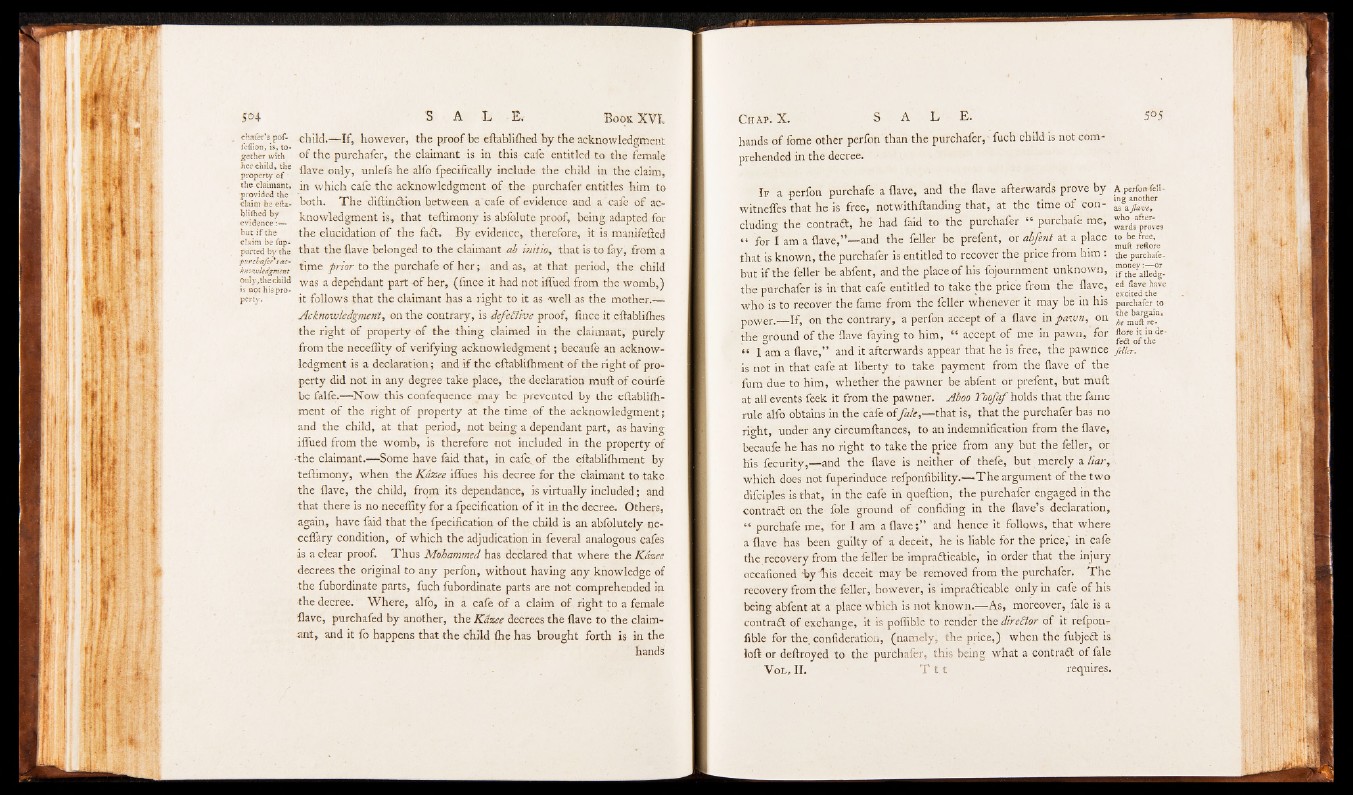
chafer’s pof-
feffion, is, together
with
her child, the
property of
the claimant,
provided the
claim be efta-
blilhed by
evidence:—•
but if the
claim be fup-
ported by the
purchafer* s acknowledgment
only,the child
is not his property..
child.— If, however, the proof be eftabliflhed by the acknowledgment
of the purchafer, the claimant is in this cafe entitled to the female
Have only, unlefs he alfo fpeoifically include the child in the claim,
in which cafe the acknowledgment of the purchafer entitles him to
both. The diftinfition between a'cafe of evidence and a cafe of acknowledgment
is, that teftimony is abfolute proof, being adapted for
the elucidation of the fadh By evidence, therefore, it is manifefted
that the (lave belonged to the claimant ab initio, that is to lay, from a
ti.me prior to the purchafe of her; and as, at that period, the child
was a dependant part o f her, {lince it had not iffued from the womb,)
it follows that the claimant has a right to it as -well as the mother.—
Acknowledgment, on the contrary, is defe&we proof, fince it eftablifhes
the right of property o f the thing claimed in the claimant, purely
from the neceffity o f verifying acknowledgment; becaufe an acknowledgment
is a declaration; and if the eftabliihment of the right o f property
did not in any degree take place, the declaration mud of courle
be falfe.— Now this confeqiaence may be prevented by the eftablifh-
ment of the right of property at the time of the acknowledgment;
and the child, at that period, not being a dependant part, as having
iffued from the womb, is therefore not included in the property of
•the claimant.— Some have faid that, in cafe, of the eftabliffiment by
teftimony, when the Kazee iflues his decree for the claimant to take
the Have, the child, from its dependance, is virtually included; and
that there is no neceffity for a fpecification of it in the decree. Others,
again, have faid that the fpecification of the child is an abfolutely ne-
ceflary condition, of which the adjudication in feveral analogous cafes
is a clear proof. Thus Mohammed has declared that where the Kazee
decrees the original to any perfon, without having any knowledge of
the fubordinate parts, fuch fubordinate parts are not comprehended in
the decree. Where, alfo, in a cafe of a claim of right to a female
Have, purchafed by another, the Kazee decrees the flave to the claimant,
and it fo happens that the child ffie has brought forth is in the
hands
hands of fome other perfon than the purchafer, - fuch child is not comprehended
in the decree.
If a nerfou purchafe a Have, and the flaVe afterwards prove by A perfon fell-
* r . , _ .. , , . c ing another
witnefles that he is free, notwithftaiiding that, at the time or con- as ajiaevCt
eluding the contract, he had faid to the purchafer “ purchafe me,
“ for I am a flave,”— and the feller be prefent, or abfent at a place
that is known, the purchafer is entitled to recover the price from him: the purchafebut
if the feller be abfent, and the place of his fojournment unknown, ™th7alkd°gthe
purchafer is in that cafe entitled to take the price from the Have, ^ f la v e h a v e
who is to recover the fame from the feller whenever it may be'in his purchafor to
power.— If, on the contrary, a perfon accept of a flave mpawn,^ on
thé ground of the flave feying to him, “ accept of me in pawn, for
“ 1 am a flave,” and it afterwards appear that he is free, the pawnee filler.
is not in that cafe at liberty to take payment from the flave of the
fum due to him, whether the pawner be abfent or prefent, but muft
at all events feek it from the pawner. Aboo Toofaf holds that the fame
rule alfo obtains in the cafe offa it,— that is, that the purchafer has no
right, under any circumftances, to an indemnification from the flave,
becaufe he has no right to take the price from any but the feller, or
Kis fecurity,—and the flave is neither of thefe, but merely a liar,
which does not fuperinduce refponfibility.— T h e argument of the two
difciples is that, in the cafe in queftion, the purchafer engaged in the
contrail on the foie ground of confiding in the flave’ s declaration,
“ purchafe me, for I am a flave;” and hence it follows, that where
a flave has been guilty of a deceit, he is liable for the price, in' cafe
the recovery from the feller be imprafticable, in order that the injury
occafioned -by'his deceit may be removed from the purchafer. The
recovery from the feller, however, is impracticable only in cafe of his
being abfent at a place which is not known.— As, moreover, fale is a
contract of exchange, it is poffible to render the director of it refponr
fible for the, confideration, (namely, the price,) when the fubjeil is
loft or deftroyed to the purchafer, this being what a contrail of fale
V ol. II. T t t requires. .